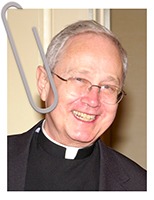In the back of my head, I have wondered why Jesus was baptized. After all, Jesus is the Son of God. He is sinless. There had to be something more.
Now that the Christmas Gospels are over, we celebrate a feast of the Baptism of Jesus.
The question occurs. If I were John the Baptist standing in the Jordan, I am sure I would have asked Jesus, “why are you asking me, a sinner, to baptize you?” What’s behind God speaking
So why did Jesus get baptized?
Let’s step back a moment
It’s John’s mission to get everyone ready for the next phase when the Messiah does come (Lk. 3:4-6, 15-17). He stresses repentance as preparation.
God speaks up at Jesus’ baptism
After all the people had been baptized and Jesus also had been baptized and was praying,* heaven was opened and the Holy Spirit descended upon him in bodily form like a dove. And a voice came from heaven, “You are my beloved Son; with you, I am well pleased.” Luke 3:21
Why is God well pleased?
A clue… Centuries earlier, Isaiah used almost the same words of a missionary from God, the “suffering servant”.
Thus says the LORD:
Here is my servant whom I uphold,
my chosen one with whom I am pleased,
upon whom I have put my spirit;
…
I, the LORD, have called you for the victory of justice, I have grasped you by the hand; I formed you, and set you as a covenant of the people, a light for the nations,
to open the eyes of the blind, to bring out prisoners from confinement,
and from the dungeon, those who live in darkness. Is 42
Jesus is God’s missionary and God underlines his mission.
So, in effect, Luke presents God spelling out the meaning of Jesus’ Baptism. The rest of his gospel, featured in this liturgical year, is about how Jesus fulfilled that mission.
These gospels tell us that mission will involve misunderstanding, suffering, even death on a cross… but also resurrection.
Our Baptism as “missioning“
The baptism of Jesus also tells us about our own baptism. Baptism is more than washing away our sins. The Spirit commissions us with the same mission that Jesus had.
Therefore, we are to be servants of the Lord working for peace and justice, prophets preaching the good news of God’s love and compassion. We are to be a healing presence. Our mission requires changing our way of thinking, and our self-centeredness.
How do we continue the mission of Jesus? Anytime we are a healing and peaceful presence in our families, our neighborhood, our workplace, and politics, we are living out our Baptism sharing the mission of Jesus. We become the beloved missionary Isaias spoke about… and Jesus lived.
Pope Francis reminds us
120. In virtue of their baptism, all the members of the People of God have become missionary disciples (cf. Mt 28:19). All the baptized, whatever their position in the Church or their level of instruction in the faith, are agents of evangelization,.. we are always “missionary disciples”.
If we are not convinced, let us look at those first disciples, who, immediately after encountering the gaze of Jesus, went forth to proclaim him joyfully: “We have found the Messiah!” (Jn 1:41).
The Samaritan woman became a missionary immediately after speaking with Jesus and many Samaritans come to believe in him “because of the woman’s testimony” (Jn 4:39). So too, Saint Paul, after his encounter with Jesus Christ, “immediately proclaimed Jesus” (Acts 9:20; cf. 22:6-21). So, what are we waiting for? (Evangelii Gaudium)
Is God “well pleased” with how we live our baptismal mission?
Click below for an audio version of this Vincentian Mindwalk.


Father John, thank you for another interesting journey.
Jewish “baptism” was always a mystery for me and even more so because there was already the Greek word baptizo in the Jewish vocabulary of the New Testament. Wikipedia is famous for providing both information and a rabbit warren of source material to better understand the information provided.
The search for “Jewish Baptism” led me to the “History_of_Baptism” link in Wikipedia and I learned about *tvilah* which was a ritual purification used by the Hebrew community. The “Second Temple Period” was where the term Baptism replaced the word tvilah and nearly always involved immersion in a running stream of water.
https://en.wikipedia.org/wiki/History_of_baptism
As for your question, which was probably rhetorical, nonetheless, I think I would answer: “Not yet, but I’m still working on it.”
Blessings in the New Year!
Thank you, Fr. John, for this wonderful insight on our “Baptismal mission”.
Great way to refocus my life in this new year 2022!